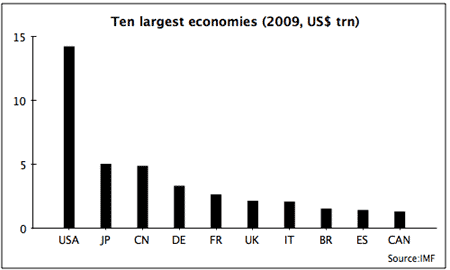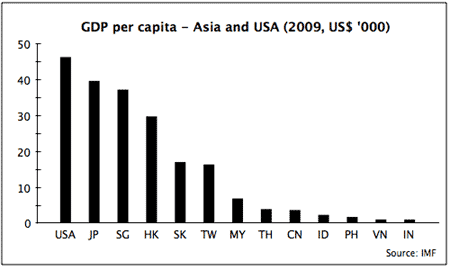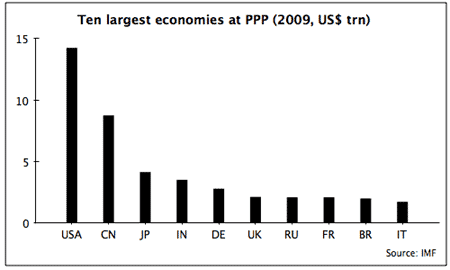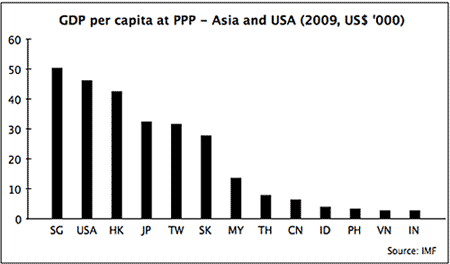Is China's economy really bigger than Japan's?
Last week, China passed Japan as the world's second-biggest economy. But this fact isn't as significant as it seems, says Cris Sholto Heaton. Here, he explains why measuring China's GDP is fraught with difficulty, and how China really stacks up when compared to its Asian neighbours.

Get the latest financial news, insights and expert analysis from our award-winning MoneyWeek team, to help you understand what really matters when it comes to your finances.
You are now subscribed
Your newsletter sign-up was successful
Want to add more newsletters?

Twice daily
MoneyWeek
Get the latest financial news, insights and expert analysis from our award-winning MoneyWeek team, to help you understand what really matters when it comes to your finances.

Four times a week
Look After My Bills
Sign up to our free money-saving newsletter, filled with the latest news and expert advice to help you find the best tips and deals for managing your bills. Start saving today!
The headline-grabbing story last week was that China has passed Japan as the second largest economy in the world. But is this a milestone? Not really. This week I'll be looking at why China has been larger than Japan for years - or is still far behind, depending on how you look at it.
China is still a poor country
We all know that saying that China's economy is now larger than Japan's is rather arbitrary. It's not like it suddenly doubled in size. It was almost as big last year and it will be slightly bigger next year. The only reason that it's a story now is because the media is fascinated with milestones and anniversaries. They make an easy way of filling up space.
In short, China is poorer than Japan and yet its economy has been larger for quite some time. And that's worth knowing because it tells you a lot more about the country than the day on which it passed some arbitrary benchmark.
MoneyWeek
Subscribe to MoneyWeek today and get your first six magazine issues absolutely FREE

Sign up to Money Morning
Don't miss the latest investment and personal finances news, market analysis, plus money-saving tips with our free twice-daily newsletter
Don't miss the latest investment and personal finances news, market analysis, plus money-saving tips with our free twice-daily newsletter
The chart below shows the world's ten largest economies, according to the IMF. It still shows China slightly behind Japan, since I'm using 2009 data as that's the latest complete set. It's mostly the G7 industrialised nations plus China - but notice Brazil is also in there as another emerging economy.

The first thing to say about GDP is that it's just a measure of how large the economy is. It doesn't tell you anything about how wealthy the country really is, in terms of how much its citizens earn. Yet that is what people really care about.
For that, we need to look at measures such as GDP per capita. And on that score, wealthy and advanced Japan is still well ahead of China. Even if they do have roughly the same size economies, China has ten times as many people.
In fact, as the chart below shows, China is much less wealthy than Japan. It's also much less wealthy than many other Asian countries that have smaller overall economies.

Why is this relevant? Well, because one of the favourite emerging market themes these days is the emerging consumer. But what this relatively low GDP per capita tells you is that in countries to the right of the axis, there are still hundreds of millions of people who are not going to start consuming much more any time soon.
Take India, on the end of the axis. There are plenty of newly rich and middle class in India's booming cities. But it's a small part of the overall population. The Indian consumer is a very strong investment theme. But you should be cynical of people who suggest they've got a waiting market of hundreds of millions. The consumer story is a multi-decade event, not an overnight switch.
Prices make a big difference
Some of the better coverage of China overtaking Japan picked up on the difference in GDP per capita. But the problem with the comparison goes further.
The price of goods and services varies greatly from country to country. An income of $20,000 a year goes much further in Taiwan than in Japan, for example. This difference in prices isn't reflected when comparing national GDPs at the market exchange rate.
Expert tips & advice for investing in Asia! Claim your FREE guides from MoneyWeek that include:
- How to go about investing to Asia
- Which brokers to use to buy foreign shares
So to adjust for this, we can look at GDP measured at purchasing power parity (PPP) exchange rates. This attempts to equalise the relative prices in each country. Obviously there's quite a bit of uncertainty in this. But then there's quite a bit of uncertainty in estimating GDP in the first place.
The chart below shows the world's largest economies measured at PPP. The Chinese economy is apparently far larger than Japan on this measure. And notice that India - just outside the top ten on market rates - is now number four. Russia is now seventh. Conclusion? The G7 are rapidly getting pushed out by the new emerging-market giants

And of course, we can then look at GDP per capita using PPP, which you can see in the chart below. Almost all of Asia gets an income boost on the score. In fact, Singapore is now wealthier than the US. And you can see what I meant earlier about Taiwan - on this score, it's wealthier than Japan.

China's missing income
For a third wrinkle, there's the question of what China's GDP statistics are measuring. There's always a lot of cynicism around these. There's little doubt that the numbers towards the end of the 1990s were fudged. They hid a big slowdown in the wake of widespread state-owned enterprise restructuring and a banking crisis. I'm less convinced that the same happened in the latest global recession.
But any deliberate fakery pales into insignificance compared to the sheer difficulty of measuring an economy that is the size of China's. Especially as it's still developing from a very low base, and is doing so very quickly. In particular, it's widely accepted that the size of the services sector is under-reported. Many transactions take place for cash and are never reported.
This again means that the economy is larger than the statistics suggest. It also probably means that the much-cited imbalances in between investment, exports and consumption are less than the headline numbers suggest. There's no doubt that China does have an investment-heavy economy (although it's often viewed as export-dependent, investment is really the key driver). But consumption is probably not as low as 35% of GDP, as the official numbers have it.
This kind of thing doesn't lend itself to being measured very easily. But a recent study by Wang Xiaolu for Credit Suisse focusing on 'grey income' in China concluded that this probably totalled RMB10trn or 30% of GDP in 2008. Some of this grey income is from illegal activities or from bribes received by officials. But much is basically legitimate, if undeclared. Many Chinese businesses pay unaccounted-for bonuses, welfare or expenses to employees on top of their salaries.
The study reckons that GDP was probably 10% larger than reported in 2008. Obviously, there's a pretty large margin of error in something like this. But the broad picture of a substantial unaccounted-for economy is consistent with plenty of anecdotal evidence.
China has already revised its statistics up a couple of times in the past few years. It now includes better estimates as to the size of the service sector. Each time the revision has been the size of a medium-sized economy. There's little reason to suppose that the statisticians have found it all yet.
So overtaking Japan may have made the headlines, but it wasn't really news. As is often the case, the real story is much less tidy. But a lot more meaningful.
This article is from MoneyWeek Asia, a FREE weekly email of investment ideas and news every Monday from MoneyWeek magazine, covering the world's fastest-developing and most exciting region. Sign up to MoneyWeek Asia here
Get the latest financial news, insights and expert analysis from our award-winning MoneyWeek team, to help you understand what really matters when it comes to your finances.

Cris Sholt Heaton is the contributing editor for MoneyWeek.
He is an investment analyst and writer who has been contributing to MoneyWeek since 2006 and was managing editor of the magazine between 2016 and 2018. He is experienced in covering international investing, believing many investors still focus too much on their home markets and that it pays to take advantage of all the opportunities the world offers.
He often writes about Asian equities, international income and global asset allocation.
-
 Early signs of the AI apocalypse?
Early signs of the AI apocalypse?Uncertainty is rife as investors question what the impact of AI will be.
-
 Reach for the stars to boost Britain's space industry
Reach for the stars to boost Britain's space industryopinion We can’t afford to neglect Britain's space industry. Unfortunately, the government is taking completely the wrong approach, says Matthew Lynn